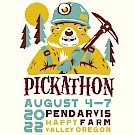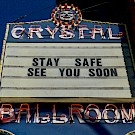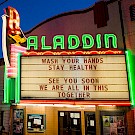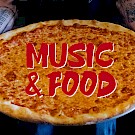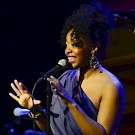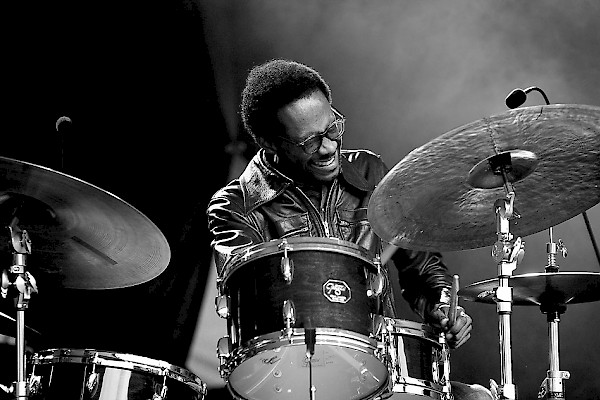 Brian Blade at the Stockholm Jazz Festival in 2010: David Bjorken/Jazzfoto.seOne of jazz’s truly special—and unknowingly omnipresent—talents, drummer Brian Blade, is also one of its most versatile. Having graduated from playing gospel in the sanctuary of his father’s Shreveport, La., church to a 15-year tenure with legend Wayne Shorter’s eponymous quartet, Blade has performed and recorded with some of the genre’s heaviest figures, including Shorter, saxophonists Chris Potter and Joshua Redman, and guitarists Bill Frisell, Pat Metheny and Kurt Rosenwinkel. Blade also features prominently on some of Portland pianist Darrell Grant’s finest work, including 1994’s Black Art and 2007’s Truth and Reconciliation.
Brian Blade at the Stockholm Jazz Festival in 2010: David Bjorken/Jazzfoto.seOne of jazz’s truly special—and unknowingly omnipresent—talents, drummer Brian Blade, is also one of its most versatile. Having graduated from playing gospel in the sanctuary of his father’s Shreveport, La., church to a 15-year tenure with legend Wayne Shorter’s eponymous quartet, Blade has performed and recorded with some of the genre’s heaviest figures, including Shorter, saxophonists Chris Potter and Joshua Redman, and guitarists Bill Frisell, Pat Metheny and Kurt Rosenwinkel. Blade also features prominently on some of Portland pianist Darrell Grant’s finest work, including 1994’s Black Art and 2007’s Truth and Reconciliation.
Unlike many of his contemporaries, however, Blade has quietly amassed an impressive roll of session credits that widely exceed the scope of contemporary jazz. Within a span of roughly five years, he recorded with Joni Mitchell and was personally sought by U2 producer Daniel Lanois for Bob Dylan’s Time Out of Mind. Blade later performed on over half of Come Away With Me, Norah Jones’ 11-times platinum 2002 release, and similarly contributed to Iron and Wine’s Ghost on Ghost two years after.
Often reminiscent of Tony Williams, the delicate subtlety and conversational qualities that distinguish Blade’s drumming remain the principal underpinnings of his preeminence. Yet, the derivative instincts empowering Blade’s broad stylistic traverse are no less singular. In contrast with the plurality of jazz musicians, most often seating themselves at the piano when writing or sketching ideas, Blade has taken to composing on the guitar, which he finds a more immediate creative partner. The instrument may also act as something of a bridge to the singer-songwriter tradition of Neil Young and Mitchell, whose influence Blade often elevates to that of jazz deities like Shorter and John Coltrane. 2009’s Mama Rosa, named for Blade’s grandmother, features his guitar playing and vocals, and can be considered Blade’s attestation to the primacy of folk storytelling within the expanse of his musical identity and playing—at once endlessly complex and fully human in its narrative sophistication.
A marquee act of the 2016 Biamp PDX Jazz Festival, Brian Blade & The Fellowship will perform at Portland’s Revolution Hall on Thursday, February 25. Speaking in advance of this appearance, Blade looks back on Landmarks, The Fellowship’s conceptually episodic 2014 release, and discusses his relationship with the guitar and the advancement of a musical narrative through drumming. Blade also speaks to his formative experiences and broader approach to recording beyond jazz, name-checking three of Portland's favorite record stores in the process.
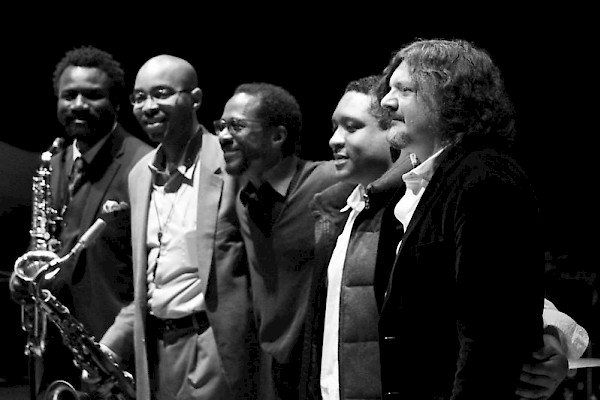 Brian Blade & The FellowshipLet’s start with what you’re touring on right now. Are The Fellowship playing dates to gear up for a new album? Or is the band still working primarily with Landmarks?
Brian Blade & The FellowshipLet’s start with what you’re touring on right now. Are The Fellowship playing dates to gear up for a new album? Or is the band still working primarily with Landmarks?
Well, we’ve kind of completed the majority of a new recording. There are still some bits to be finished, but really, we’re playing primarily from and perhaps some of this new music that hopefully will get released during the year. But we try and just keep playing as consistently as we can, record or no record, and I’m looking forward to coming back out to Portland, obviously—always!
I sensed something of a dichotomy with Landmarks: There’s a great narrative flow and an arc to the compositions, yet they also seem like individual entities, a series of snapshots or scenes from a trip. Is that accurate? Or is there a broader storyline as you see it?
I appreciate your impression of what the record is and what the trip is. And in that—how you describe these snapshots along a trip, so to speak—it does kind of speak to landmarks in the broader sense of what we do as a band together; our regard for the compositions that are really born for the band, specifically from me. I write for Myron Walden and Melvin Butler and Chris Thomas and Jon Cowherd [aka The Fellowship]. Hopefully something comes to me that has, for lack of a better description, the essence of jazz—this improvisatory opening and vehicle that gives us the opportunity to speak freely. But also, aside from that, the trust and the ability to do that together, to just take off and fly freely. We all have this respect and regard for the simplicity of a melody and a poetic, brief look at something, and honor that without necessarily injecting it with a lot of other things.
I do suppose, if there is a dichotomy there, it’s that. Simply stated, that’s sort of what’s there. With a piece like “Shenandoah” [listen at the end of this interview], that’s existed forever—I don’t want to do anything else to it. I just want to render the piece and have it speak in its power and brevity and enjoy that. But with something like “Ark.La.Tex.,” you’re crossing three straight state lines, so I like that as well. It always manifests itself this way for us in concerts as well. Hopefully the listener is taken on or takes this journey with us, so to speak.
Did you do a lot of the writing for Landmarks on the guitar?
I do a lot of writing on the guitar. The other body of music that comes to or is for the band comes from Jon Cowherd, and he primarily composes on the piano, or sometimes just in his head [laughs]. But because of our bond and friendship, it seems to coexist together as one thing when it all comes together.
I like that contrast and that mingling of harmonies, even if it’s basically the same chord or voicing. When you hear it played on the guitar, and you hear it played on the piano, there’s still this different resonance, no matter the tones. So it’s great when all those things mingle and create sort of a polyphonic vibration.
That really struck me because even a lot of guitarists—like Kurt Rosenwinkel—will write on the piano. What are the guitar’s distinct qualities, as you see them?
It’s just my own personal connection, basically. I’ve written a handful—maybe two or three things—or less at the piano. But it just seems that the guitar is always with me, and it became my medium for my expression and writing.
I used to have to, when I would dedicate something to the page—after I felt like, “This is a composition and something’s cooking here,” I would sit at the piano with the guitar, and I would play everything, like, “Play this on the guitar, play that on the piano.” Other things would get revealed, sometimes, if I sat at the piano. But I haven’t been doing that over the last, I don’t know, decade. I’m just at the guitar and that’s it. It’s just what I have and what I feel most productive with as an instrument.
Do you view drumming and playing guitar as representative of two distinct faces of your identity as a musician? Or do they flow from the same place?
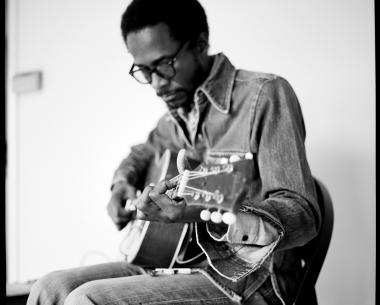 You know, it’s weird: When I’m writing, I have a guitar. Very rarely does it start with a thought of drumming, like what the drummer is going to do. “What am I going to do when I move to the drums?” [Laughs] It’s great, I like not even having a thought of that sometimes—most times.
You know, it’s weird: When I’m writing, I have a guitar. Very rarely does it start with a thought of drumming, like what the drummer is going to do. “What am I going to do when I move to the drums?” [Laughs] It’s great, I like not even having a thought of that sometimes—most times.
Then when I bring this composition to The Fellowship band, I have to actually step outside of it and say, “Okay, I need to play this guy’s song now,” as the drummer in the band and say, “Now I need to figure out my part.” [Laughs] It gives me a new lease and a new perspective, objectively, of this song. So it’s a funny trip, but I enjoy it.
In prior interviews, you’ve spoken at length about the importance of storytelling in music. As you see them, what are the mechanisms for narrative expression on the drums? What would you tell someone in the audience to listen for if they wanted to follow that narrative?
Well, there is the harmonic rhythm. It’s always there. You have to not necessarily lean into it, but the drummer, I think, needs to be aware of it and to project that, tonally and rhythmically, in every pulse that is coming out. It speaks, hopefully, to the song; you’re still serving the song.
So I think it’s important, even if it’s you just doing your duty and being the drummer in the band holding down the groove. It’s very important, so I feel like it’s all there; the essence of the music. You just have to hear it and put it out through your instrument—drums being no exception.
The reason I wanted to ask you that was because a few months ago I was able to interview Antonio Sanchez, and he made a point of saying that expression isn’t just limited to pitch melody.
Exactly! Yeah, I agree. I mean, listening to someone like Art Blakey playing the drums, or Elvin [Jones], it sounds like a village of people having a conversation. The multiplicity and the singularity of the instrument is amazing; how much it can encompass or how complex—or how simple—the idea you choose to express is. It really all depends on what you’re feeling, and who you are, and what the need is at the moment. So I try and follow that.
One thing about you that really stands out is the extent to which folk artists like Joni Mitchell have factored into the fabric of your character as a jazz musician. Is that narrative quality the principal commonality binding those two genres?
Well, it has definitely informed my way of trying to express our music. She’s such a great inspiration and an influence, and so deep. I think about the poetry and the harmony and the full expression, how deep it can get in a song and all the music that she’s birthed throughout the years. It’s set the bar so high and it makes me want our music to have staying power—just that long, touching power to it.
When you’re working with someone like Joni Mitchell or Bob Dylan, do you feel like you have the same freedom of expression that you might when you’re with Wayne Shorter, for example? Is your musical vocabulary circumscribed by anything?
You know, it’s funny—I still feel the same liberty and I never feel any restriction to what I can express or should express. I’m just always met with the same challenge: “Am I serving the song? What is needed here to make it better?” That company you just mentioned, it’s already something great. It doesn’t necessarily need me at all. But if I’m there and I’m going to be in it, how can I really contribute to the music and bind it and make it somehow that much more of a great thing?
So that’s always my challenge. Now, it’s not even a thought. It’s just, “Okay. Move in that spirit and don’t let yourself get in the way of it.”
Is that intuition a skill or something that you’ve had to practice or develop? Or is it more innate?
I have to attribute it to how I was raised and the environment—a church family and learning to play in church. That foundation prepared me for everything else after the fact, whether it was a nightclub or a concert hall or a dive bar. It’s just still needing to serve the song. So it’s great that I never had to think about that or readjust myself to say, “Oh, I’ve just been playing alone all these years or living in a vacuum.” It’s a communal thing. You’re a part of it and how can you make it better?
When you’re brought in for a recording session, is there anything you listen for that might instruct how you play? Do you have any guideposts?
Well, no, not really. I mean, I’m trying to take in everything at that moment; if someone’s just teaching a song or if we’re looking at music. There’s that challenge of selectivity. There’s no drum part, necessarily. Do I try and catch every little dot and dash on the page here? Or, while I’m looking for it, is my ear telling me—which is kind of ultimately the whole deal—what I need to find a thread through all of this and not even acknowledge rhythmically what’s running around me? Is that what’s needed to bind it all together?
So it’s a funny decision or challenge that needs to be made and hopefully you find a thing that really makes the song great. It’s often all those elements: “What is everybody else playing? What do I need to do to contribute to that—or not. Maybe I don’t need to play at all!” [Laughs] So there’s a cool balance and decision that needs to be made from moment to moment.
On balance, do you feel like you really developed more on the bandstand and through playing experience as opposed to solitary practice?
Oh, absolutely. I mean, balanced by that time alone, which is absolutely necessary. You know, it was just playing anything—the physical demands and cultivating ideas, and then that practical experience given by so many heroes of mine in New Orleans.
Sometimes you’re not necessarily, in your mind, ready for something. Yet an invitation comes, and I guess you have to question if you accept, or what it’s really about. Are you just doing this for the money? Or are you really looking to learn something? So it’s great to have been given those opportunities, and to mess up, or feel inadequate in the process. Your elders or your peers, who trusted you enough and knew that the potential was there, and, given a little time, knew it was all going to converge within you and make something better come from you. So it’s been great to have had that.
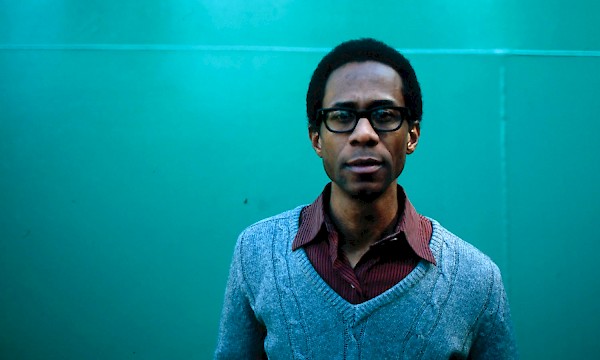 Was it important for you to have gone out and played in situations that exceeded your skill at the time?
Was it important for you to have gone out and played in situations that exceeded your skill at the time?
Oh, man—immeasurably. It was so great. I’m so thankful for that. Six nights a week in a hotel lobby and thinking that I needed to be doing something else like playing modern jazz at some club; it wasn’t about that. It was about Fats Domino and “Blueberry Hill” right then, and how can you make it great right then and play a groove and have people enjoy it? You wrap your mind around the depth of that before you can sort of freak out and play something that is totally extemporaneous [laughs].
There’s the discipline and the balance of those things that prepares you to take flight later. Without that root, you’re going to wither on the vine [laughs]. We need to get some foundational thoughts embedded in us—and experiences. Not that some of us don’t just come out flying, but I’m so thankful for those great experiences where I was just playing songs—R&B and, obviously, out of gospel—just popular music in communal situations.
I don’t think I would be able to feel as confident when I walk on stage with Wayne Shorter, and he’s saying, “Okay, let’s just start playing”—from nothing [laughs]. There’s the challenge: If you want to improvise, go ahead—do that [laughs]. But are we going to create something together while we do this? Or are we just going to sort of exist in our own worlds? All the things leading up to that time prepared me for that and gave me some ground to stand on.
In light of Donny McCaslin and Ben Monder working with David Bowie, I’ve heard a lot of talk about the resurgence of jazz. With respect to its role in popular music, I feel like jazz has been there all along. Are we in the midst of a resurgence or have we just failed to listen closely enough?
Yeah, I think it’s always been there. A lot relies on what tends to reach people, but it doesn’t necessarily speak to the value of something. You hope that what you do will reach as many people as possible. There are so many great artists whose music may not get written about and might not find its way into the public eye so quickly or widely. But, at the same time, I think that music is going on and musicians are making great music all the time. I think that we, in general, just need to look outside of what comes to us.
That’s what I love about going to the record store, man! Thank god they’re still there. You can always go to the record store and hear something you’ve never heard. I mean, I’m always listening to the radio all the time, too, wherever I am. But just going to the shop and looking for something specific and then you hear something else that takes you down this other aisle. I love that experience, and hopefully we can still step out and experiment and want to hear things that aren’t necessarily already sort of being popularized. I think it’s a good thing—that balance.
There are musicians who are always listening and watching. But then there’s the general public, which then brings up questions about the music and its existence or resurgence and these things. It really continues outside of that conversation.
Do you think that the digital music marketplace is conducive to discovery in the way you just described? Or, as a medium, is it inherently limiting?
I mean, I would hope so. There is the—I forget what they call it—the sort of “Oh, if you like this, then you may like this.” There is that, which is cool. It’s great, because you might not be looking for that thing. And then it’ll take you to something else and something else, and it never has an end, which is great. So that’s definitely one way of finding out about things aside from personal suggestions.
Or like me, you might be in Everyday Music or Jackpot or Music Millennium, and be like, “Man, what’s this?” And then you end up in that aisle finding that thing, and it’s like, “Wow. Okay, what’s this?” Some metal band you’ve never heard of! Or a Sonny Rollins record from 1967 that you might not have. It all takes you in, somehow. We just have to keep our ears and eyes open.
You’ve said Wayne Shorter told you a story about Miles Davis in which Miles asked Wayne if he’d ever wanted to make music that didn’t sound like music. What does that mean to you?
Wow, that’s so heavy, you know? [Laughs] Wayne drops those things on us from time to time. The whole notion—it’s almost like it wants to retain or somehow keep that childlike vision and newness about music and life itself and playing. And not to become so jaded and play as if you’ve done it a million times and you’ve fallen into that rut of knowing it all, and that ball just doesn’t keep going up for you. So, playing music that doesn’t sound like music, that speaks to undoing some things that become too familiar, like keeping that challenge before you, to create something that surprises yourself. It’s really such a challenge to do that.
Looking at Miles’ life and history through music, it’s something that Wayne says, too: “Take a chance.” That chance-taking, tempered by his [Davis’] great sensibility and taste for bringing the right musicians together himself—knowing what he had a spark for—but then not knowing that beautiful place, and stepping into it faithfully, but not really knowing if it might work. Like, “Bitches Brew? Let’s give it a shot." [Laughs]
But, man, the benefit and the beauty of that chance-taking! If he had not, if he had continued playing My Funny Valentine, perhaps 99 percent of us would have been happy with that. But he wouldn’t have been. And that’s the bottom line. As an artist, he had to be true to what he heard and it pushed the culture into a whole other direction. So hopefully those revolutions can still occur—and do—and we set things in motion or put things out into the world that change our view of things a bit.

